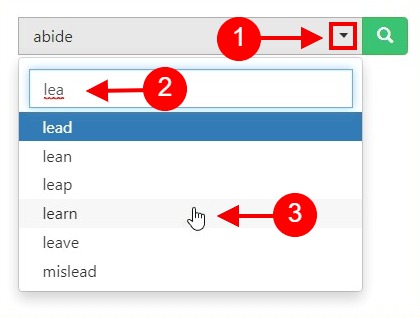* Esta forma é obsoleto ou usado em casos especiais ou alguns dialetos
Conjugação de um verbo irregular [thrive]
Conjugação é a criação de formas derivadas de um verbo de suas partes principais por inflexão (alteração de forma de acordo com regras de gramática). Por exemplo, o verbo "quebra" pode ser conjugado para formar as palavras quebrar, quebrar, quebrou, quebrada, quebrada e quebrar.
A conjugação do termo é aplicada apenas à inflexão de verbos, e não de outras partes de fala (inflexão de substantivos e adjetivos é conhecida como declinação). Também é muitas vezes restrito a denotação da formação de formas finitas de um verbo - estes podem ser referidos como formas conjugadas, em oposição a formas não finitas, como o infinitivo ou gerúno, que tendem a não ser marcados para a maior parte do Categorias gramaticais.
Conjugação é também o nome tradicional para um grupo de verbos que compartilham um padrão de conjugação semelhante em uma linguagem específica (uma classe de verbo). Um verbo que não segue todos os padrões de conjugação padrão do idioma é um verbo irregular .
Condicionais
(Condicional)
de um verbo irregular [thrive]
Causalidade (também referido como causação ou causa e efeito) é influência pelo qual um evento, processo, estado ou objeto (um Causa) Contribui para a produção de outro evento, processo, estado ou objeto (um efeito) onde a causa é parcialmente responsável pelo efeito, e o efeito é parcialmente dependente da causa. Em geral, um processo tem muitas causas, que também são fatores causais para isso, e todas mentem no passado. Um efeito pode, por sua vez, ser uma causa ou fator causal para, muitos outros efeitos, que todos estão em seu futuro.
O humor condicional (abreviado cond) é um humor gramatical usado em frases condicionais para expressar uma proposição cuja validade depende de alguma condição, possivelmente contrafactual.
O inglês não tem um humor condicional inflexivo (morfológico), exceto em tanto quanto os verbos modais poderiam, podem, e poderiam, em alguns contextos, ser considerados como formas condicionais de pode, maio, e serão respectivamente. O que é chamado de humor condicional inglês (ou apenas o condicional) é formado periféricamente usando o verbo modal seria em combinação com o infinitivo nu do verbo seguinte. (Ocasionalmente deve ser usado no lugar de um sujeito de primeira pessoa - ver deve e vontade. Também os verbos modais acima mencionados poderiam, podem e devem substituir, a fim de expressar a modalidade apropriada, além da condicionalidade.)
Condicional Presente
(Conditional present)
Condicional Presente Contínuo
(Conditional present progressive)
Última Condicional
(Conditional perfect)
Conjuntivo
(Subjunktiv)
de um verbo irregular [thrive]
O humor imperativo é um humor gramatical que forma um comando ou solicitação.
Um exemplo de um verbo usado no humor imperativo é a frase em inglês "ir". Tais imperativos implicam um assunto de segunda pessoa (você), mas algumas outras línguas também têm imperativos de primeira e terceira pessoa, com o significado de "Vamos (fazer algo)" ou "deixe-os (fazer algo)" (os formulários podem alternativamente, ser chamado coorativo e jussive).
O Subjuntivo é um humor gramatical, uma característica do enunciado que indica a atitude do falante em relação a ela. As formas subjuntivas de verbos são normalmente usadas para expressar vários estados de irrealidade, como: desejo, emoção, possibilidade, julgamento, opinião, obrigação ou ação que ainda não ocorra; As situações precisas em que são usadas variam de linguagem para a linguagem. O subjuntivo é um dos humores de irrealis, que se referem ao que não é necessariamente real. Muitas vezes, é contrastante com o indicativo, um humor real que é usado principalmente para indicar que algo é uma declaração de fato.
Subjuntivos ocorrem na maioria das vezes, embora não exclusivamente, em cláusulas subordinadas, particularmente aquelas cláusulas. Exemplos do subjuntivo em inglês são encontrados nas frases "Eu sugiro que você seja cuidadoso" e "é importante que ela permaneça ao seu lado".
O humor subjuntivo em inglês é um tipo de cláusula usado em alguns contextos que descrevem possibilidades não real, por exemplo "É crucial que você esteja aqui" e "é crucial que ele chegue cedo". Em inglês, o subjuntivo é sintático em vez de inflexão, uma vez que não há forma verbal especificamente subjuntiva. Em vez disso, cláusulas subjuntivas recrutam a forma nua do verbo que também é usado em uma variedade de outras construções.
Conjuntivo presente
(Present subjunctive)
Passado Subjuntivo
(Past subjunctive)
Imperativo
(Imperativ)
de um verbo irregular [thrive]
O humor imperativo é um humor gramatical que forma um comando ou solicitação.
Um exemplo de um verbo usado no humor imperativo é a frase em inglês "ir". Tais imperativos implicam um assunto de segunda pessoa (você), mas algumas outras línguas também têm imperativos de primeira e terceira pessoa, com o significado de "Vamos (fazer algo)" ou "deixe-os (fazer algo)" (os formulários podem alternativamente, ser chamado coorativo e jussive).
Participle
(Participle)
de um verbo irregular [thrive]
Na lingüística, um particípio (PTCP) é uma forma de verbo nãofinito que compreende aspectos gramaticais perfeitos ou contínuos em numerosos tempos. Um particípio também pode funcionar como um adjetivo ou um advérbio. Por exemplo, em "batata cozida", cozida é o particípio passado do verbo ferver, modificando adjetivamente a batata substantiva; em "nos surgiram", Ragged é o particípio passado do pano de verbo, adverbialmente qualificando o verbo correr.
